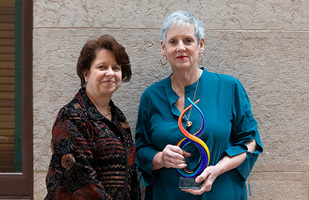Ohio Supreme Court Chief Justice Gets Award for Campaign Against Issue 1

From left: OACBHA Executive Council President Elaine Georgas and Ohio Supreme Court Chief Justice Maureen O’Connor.

From left: OACBHA Executive Council President Elaine Georgas and Ohio Supreme Court Chief Justice Maureen O’Connor.
A leading force in defeating a measure that would have changed the Ohio Constitution received an award for her efforts last fall against Issue 1.
Ohio Supreme Court Chief Justice Maureen O’Connor was awarded the President’s Partnering for Quality Award by the Ohio Association of County Behavioral Health Authorities (OACBHA) at the Statehouse this week.
“We gave this (award) to Chief Justice O’Connor because of her thorough understanding of how this initiative would have impacted the state,” said Elaine Georgas, president of the OACBHA Executive Council. “Her outreach was on point, as we need to make sure the patient is the top priority.”
Chief Justice O’Connor traveled the state last year and told voters how Issue 1 would negatively impact the work of judges and mental health providers tackling the state’s drug crisis.
“I may have fired the first shot. But without the army of the judiciary, prosecutors, sheriffs, all law enforcement, the business communities and, of course, the treatment community joining in to voice well-reasoning opposition, Issue 1 would have passed,” Chief Justice O’Connor told the gathering of county professionals.
Advocates pushing to pass Issue 1 on last November’s ballot were well-financed, but voters defeated the measure by a 2-1 margin, with 63 percent of voters voting it down.
“It was a pretty even fight,” Chief Justice O’Connor said with a wink. “They had $10 million, and we had about $1 million. But here’s the big difference – we had voices of the judiciary.”
She credited former Justice Paul Pfeifer, executive director of the Ohio Judicial Conference, as well as Lou Tobin, director of the Ohio Prosecuting Attorneys’ Association. They helped mobilize judges and prosecutors to educate the public about the dangers of Issue 1.
The county behavioral health authorities in Ohio are empowered – by statute – to plan, develop, manage, and fund community-based mental health and addiction services.
Chief Justice O’Connor said the best shot judges have in getting people off drugs are the 170 state drug courts, which offer treatment-based strategies to those who are addicted.
“The drug courts are essential to getting offenders into treatment,” Chief Justice O’Connor said. “It’s their only way out, and it’s our only way out too.”
State leaders, including Ohio House Speaker Larry Householder, were on hand to discuss how lawmakers are responding to the crisis.
“It’s a tragic epidemic,” Householder told the gathering. “Today, every single family in Ohio is affected. My hope is we work together to find a focus” on mental illness.
Chief Justice O’Connor told the crowd that she looks forward to working with legislators and other partners to make great progress this year.
“Mental health and addiction funding, in my book, is just as important as school funding, criminal justice reform, and Medicaid expansion,” Chief Justice O’Connor said. “When you think about it, all of these topics are interrelated and all require adequate funding, top-notch talent, and a Statehouse willing to prioritize.”


